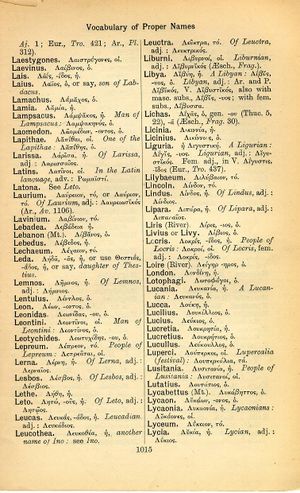Leda: Difference between revisions
Ὁ δὲ μὴ δυνάμενος κοινωνεῖν ἢ μηδὲν δεόμενος δι' αὐτάρκειαν οὐθὲν μέρος πόλεως, ὥστε ἢ θηρίον ἢ θεός → Whoever is incapable of associating, or has no need to because of self-sufficiency, is no part of a state; so he is either a beast or a god
(Names) |
(6_9) |
||
| Line 1: | Line 1: | ||
{{WoodhouseENELnames | {{WoodhouseENELnames | ||
|Text=[[File:woodhouse_1015.jpg|thumb|link={{filepath:woodhouse_1015.jpg}}]][[Λήδα]], -ας, ἡ, or use Θεστιάς, -άδος, ἡ, or say, <b class="b2">daughter of Thestius.</b> | |Text=[[File:woodhouse_1015.jpg|thumb|link={{filepath:woodhouse_1015.jpg}}]][[Λήδα]], -ας, ἡ, or use Θεστιάς, -άδος, ἡ, or say, <b class="b2">daughter of Thestius.</b> | ||
}} | |||
{{Lewis | |||
|lshtext=<b>Lēda</b>: ae, and Lēdē, ēs, f., = [[Λήδα]]>,<br /><b>I</b> the [[daughter]] of [[Thestius]], and [[wife]] of Tyndarus; she [[bore]] by Jupiter, [[who]] visited her in the form of a [[swan]], [[two]] eggs, from one of [[which]] came [[Pollux]] and Helen, and from the [[other]] [[Castor]] and Clytemnestra, Ov. H. 17, 55; id. M. 6, 109; Hyg. Fab. 77: pueri Ledae, i. e. [[Castor]] and [[Pollux]], Hor. C. 1, 12, 25.—She [[was]] deified [[after]] her [[death]], under the [[name]] of [[Nemesis]], Lact. 1, 21: Lede, Ov. Am. 1, 10, 3: chironomon Ledam saltare, i. e. in the [[part]] of [[Leda]] in a pantomime, Juv. 6, 63.—Hence,<br /><b>II</b> Lēdaeus, a, um, adj., of or belonging to [[Leda]], Ledæan.<br /> <b>A</b> Lit.: Ledaei dei, i. e. [[Castor]] and [[Pollux]], Ov. F. 1, 706; also, Lacones, Mart. 1, 37, 2: [[Helena]], Verg. A. 7, 364: [[Hermione]] (as granddaughter of [[Leda]]), id. ib. 3, 328: [[ovum]], a [[swan]]'s [[egg]], Mart. 8, 33, 21; cf. olores, id. 1, 54, 8: [[Timavus]], [[because]] [[Castor]], on the [[return]] of the Argonauts, [[let]] his [[horse]] Cyllarus [[drink]] of it, id. 4, 25, 5; cf. Cyllarus, Stat. S. 1, 1, 54: [[astrum]], i. e. [[Castor]] and [[Pollux]], Mart. 8, 21, 5.—<br /> <b>B</b> Poet., transf.<br /> <b>1</b> Spartan: Phalantum, [[Tarentum]], founded by the Spartan [[Phalantus]], Mart. 8, 28, 3: [[gurges]], i. e. of the [[Eurotas]], Stat. S. 2, 6, 45. —<br /> <b>2</b> Amyclæan ([[because]] [[Castor]] and [[Pollux]] were [[born]] at Amyclæ): [[Xanthippus]], Sil. 4, 358. | |||
}} | }} | ||
Revision as of 08:11, 13 August 2017
English > Greek (Woodhouse)
Λήδα, -ας, ἡ, or use Θεστιάς, -άδος, ἡ, or say, daughter of Thestius.
Latin > English (Lewis & Short)
Lēda: ae, and Lēdē, ēs, f., = Λήδα>,
I the daughter of Thestius, and wife of Tyndarus; she bore by Jupiter, who visited her in the form of a swan, two eggs, from one of which came Pollux and Helen, and from the other Castor and Clytemnestra, Ov. H. 17, 55; id. M. 6, 109; Hyg. Fab. 77: pueri Ledae, i. e. Castor and Pollux, Hor. C. 1, 12, 25.—She was deified after her death, under the name of Nemesis, Lact. 1, 21: Lede, Ov. Am. 1, 10, 3: chironomon Ledam saltare, i. e. in the part of Leda in a pantomime, Juv. 6, 63.—Hence,
II Lēdaeus, a, um, adj., of or belonging to Leda, Ledæan.
A Lit.: Ledaei dei, i. e. Castor and Pollux, Ov. F. 1, 706; also, Lacones, Mart. 1, 37, 2: Helena, Verg. A. 7, 364: Hermione (as granddaughter of Leda), id. ib. 3, 328: ovum, a swan's egg, Mart. 8, 33, 21; cf. olores, id. 1, 54, 8: Timavus, because Castor, on the return of the Argonauts, let his horse Cyllarus drink of it, id. 4, 25, 5; cf. Cyllarus, Stat. S. 1, 1, 54: astrum, i. e. Castor and Pollux, Mart. 8, 21, 5.—
B Poet., transf.
1 Spartan: Phalantum, Tarentum, founded by the Spartan Phalantus, Mart. 8, 28, 3: gurges, i. e. of the Eurotas, Stat. S. 2, 6, 45. —
2 Amyclæan (because Castor and Pollux were born at Amyclæ): Xanthippus, Sil. 4, 358.

